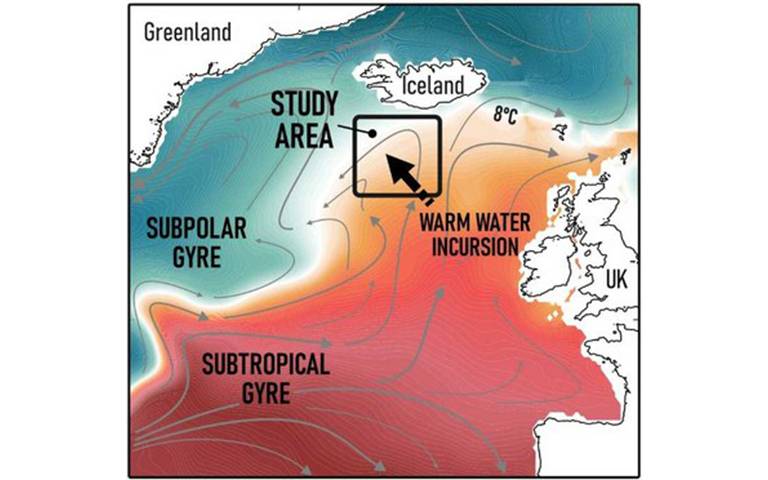Decline in NE Atlantic cold-water plankton during industrial era
4 May 2020
Peter Spooner and David Thornalley lead research showing dramatic changes

Research led by UCL Geography’s Dr Peter Spooner and Dr David Thornalley shows that there has been a dramatic decrease in cold-water plankton in the NE Atlantic during the 20th century following thousands of years of stability.
The work, published in Geophysical Research Letters, analysed the fossilised remains of plankton sampled from the Northeast Atlantic Ocean south of Iceland. It uncovered a striking change in the types of species that inhabit these waters.
Peter Spooner summarises the significance of the research:
“The Northeast Atlantic is of crucial importance for the global climate system and marine ecosystems. In this study we provide the first evidence that Northeast Atlantic circulation in the 20th century was unusual compared to the last 10,000 years.
“This change caused a replacement of cool, subpolar waters by warmer subtropical waters near Iceland, and has impacted the distribution of marine organisms, particularly plankton. The most striking aspect of our work is the exceptional nature of the shift in the 20th century, in contrast to thousands of years of relative stability, and its implications for understanding future change.”
The research builds on earlier work examining how the North Atlantic conveyor circulation has been changing during the industrial era. In collaboration with Woods Hole Oceanographic Institution (USA), the Scottish Association of Marine Science and the University of Edinburgh, this has analysed around 150,000 specimens of planktonic foraminifera, tiny single-celled creatures floating in the ocean.
Different plankton species were compared over a 10,000-year period, using deep ocean sediment to reconstruct how the Northeast Atlantic has changed. Between around 6000 BC and 1750 AD, the region was dominated by Turborotalita quinqueloba, a species of plankton that prefers cooler waters.
During the 20th century, however, the relative abundance of this species declined dramatically and was replaced by a transitional (warmer water) type of plankton, such as N. incompta and G. glutinata.
As David Thornalley explains:
“We are too used to thinking of the North Atlantic as being dominated by natural cycles that last decades. But this is only because direct observations do not go back far enough. The new records allow us to put our observations into a much longer-term context, and reveal the exceptional nature of what has happened in the 20th century.”
As well as the change from cold to warmer species, the team found indicators of changing nutrient and food availability, suggesting that waters from the subtropics are making their way to Iceland. Since the habitats of all marine species, from plankton and fish to whales, are governed by ocean circulation, temperature and food, it is evident that not only plankton has been affected.
The research was funded by a National Science Foundation grant, the Leverhulme Trust and the European Union’s Horizon 2020 Research and Innovation Framework Programme. It forms part of a major EU-funded project, ATLAS, investigating how changes in the ocean may affect deep-sea ecosystems such as cold-water corals. This work is continuing in a new project, iAtlantic, aiming to understand the ocean areas under the most rapid change.
See
- ‘Exceptional 20th century ocean circulation in the Northeast Atlantic’, Peter T. Spooner. David J.R. Thornalley, Delia W. Oppo, Alan D. Fox, Svetlana Radionovskaya, Neil L. Rose, Robbie Mallett, Emma Coope,r J. Murray Roberts. Geophysical Research Letters, 17 April 2020
- ‘Seabed fossils show the ocean is undergoing a change not seen for 10,000 years’, Peter T. Spooner, The Conversation, 28 April, 2020.
 Close
Close

